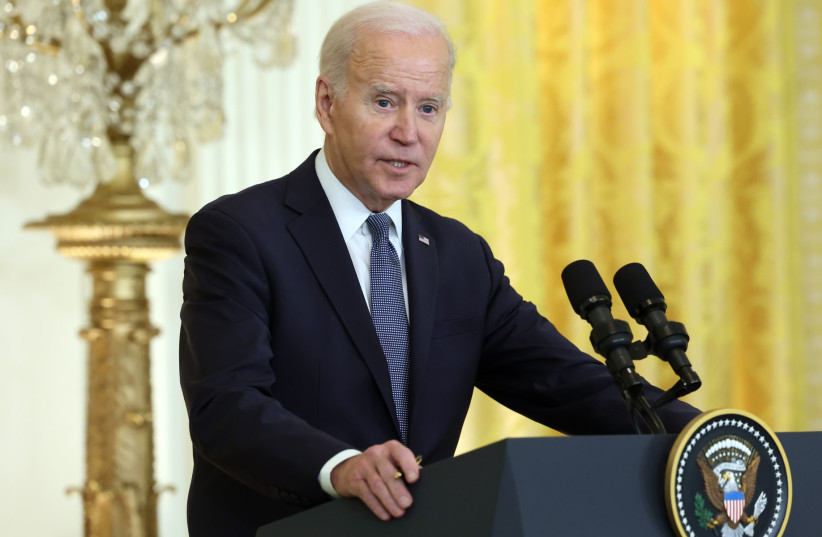Washington is clearly keen on striking a deal with Iran despite Iran’s weakness and Israeli warnings of Tehran’s determination to pursue its nuclear ambitions, an Al Arabiya interviewer said in a preface to a question he posed to prime minister-designate Benjamin Netanyahu last week. And then came the question: “What is your plan?”
That is a salient question, actually. Everyone knows that the Iranian issue, more precisely, Netanyahu’s steadfast opposition to a nuclear deal with Iran, led him to a frontal confrontation with then-US president Barack Obama. Everyone also knows that the fight over Iran was one of the main reasons – though not the only one – for the rocky relationship between the two leaders when their terms overlapped from 2009 through 2016.
With that history well understood, the question as to what Netanyahu’s plans are regarding Iran – and how this will impact his relationship with the Biden administration – is an important one, especially when the premise of the question is that Washington is keen on reaching a deal.
But that premise, as it turns out, might be faulty; or if not faulty, at least no longer relevant.
On Tuesday, a video emerged of US President Joe Biden’s comments to supporters during a campaign appearance in California on November 3, a few days before the midterm US elections, in which he said the Iran deal was “dead.”

“President Biden, could you please announce that the JCPOA is dead,” an Iranian-American Democratic activist asked the president.
“No,” Biden replied, explaining, “It is dead, but we are not going to announce it. Long story.”
Part of the “long story” as to why the deal is “dead” is due to Iran’s inflexible position in the negotiations that prevented an agreement in the summer, even though the Biden administration seemed very intent at the time on reaching one.
Then the protests that continue to rock Iran hit, followed by the government’s brutal measures to quell them. At the same time, the Iranian-Russian alliance strengthened, with Iran providing arms to Russia with which to attack Ukraine.
All of a sudden the Iranian equation changed dramatically. In this new reality, it seemed obvious that the Biden administration would not throw the ayatollahs a bone in the shape of a reworked nuclear agreement. Biden made that clear in his “the deal is dead” comment in California.
JCPOA on thin ice
EVEN BEFORE the video of Biden’s remark emerged, Netanyahu said the American position regarding entering the agreement, known formally as the Joint Comprehensive Plan of Action (JCPOA), had changed.
“Now you ask, where is America’s policy? Are they going to go back to the JCPOA and give Iran this free course paved with gold to build a nuclear arsenal?” Netanyahu said in his Al Arabiya interview.
“Well, a year and a half ago, before the protests in Iran, I would say they were certainly trying to do that. But I think there is a rethinking in Washington. I don’t think [this is the case], I’m quite convinced [that it is]. I obviously haven’t had talks yet with the administration, but I will soon. From the initial contacts that we have, I think there’s a rethinking of that. And I’m glad there is.”
There are two reasons for Netanyahu to be glad
First, because he feels and has been saying for years that the JCPOA is a disaster for Israel that would pave the way to Iran’s attainment of nuclear weapons, while at the same time providing the country with tens of billions of dollars of sanctions relief that it would use to sow chaos and mayhem in the Mideast, from Iraq, through Syria and Lebanon to Gaza and Yemen.
Second, if the Biden administration is no longer pursuing this avenue, it will remove a potentially huge land mine from Netanyahu’s relationship with Biden.
Netanyahu’s complex relationship with Obama is still very fresh in people’s minds, and his election success in November has led many to worry that Jerusalem and Washington were once again on a collision course.
The relationship will be tested as is by the hard right-wing nature of the government in Jerusalem. The US will reportedly not be dealing with incoming ministers Bezalel Smotrich (Religious Zionist Party) and Itamar Ben-Gvir (Otzma Yehudit) because of positions and statements the two have made in the past. Likewise, the new government is expected to take measures in Judea and Samaria – such as expanded building in the settlements – that will undoubtedly be a source of friction with Washington.
However, that Netanyahu will not – at least in the short term – have to go to battle with Biden and his team over the wisdom of re-entering the Iran deal, will just make things easier. This will be one less matter – a vast matter at that – to fight over.
That the Americans are not focused on entering the deal now will also allow Netanyahu to forge areas of cooperation with Washington vis-à-vis Iran.
Rather than confront the US, he can build on the work of the previous government in coordinating the next steps regarding Iran: What to do if Iran decides to move its uranium enrichment up even another step, what kind of support Israel could expect from the US if it felt the need to take military action, and what military hardware the US might provide to make Israeli military action possible.
Were the JCPOA negotiations going strong, it is unlikely Netanyahu would be willing to engage with the US on these matters – just as was the case before and after the JCPOA was signed in 2015 – not wanting to give the deal any tacit Israeli legitimacy. Now with the deal dead, as Biden said, Netanyahu can work fully with the US on Iran.
